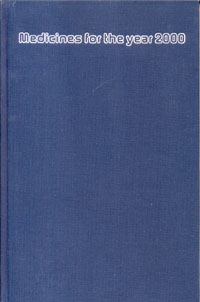A symposium held at the Royal College of Physicians, London in September 1978 by the Office of Health Economics. I do not want to trespass into…
A symposium held at the Royal College of Physicians, London in September 1978 by the Office of Health Economics.
I do not want to trespass into the field of your discussions when there are so many people better qualified than I to contribute.…
A symposium held at the Royal College of Physicians, London in September 1978 by the Office of Health Economics.
I do not want to trespass into the field of your discussions when there are so many people better qualified than I to contribute. But perhaps I could profitably say a few words about the pharmaceutical industry in Britain at the present time. On reflection this is by no means inappropriate to a consideration of medicines for the year 2000 when one thinks about the extent to which the industry has to plan ahead and the years of research and development which necessarily precede the introduction of an effective and safe medicine. This industry competes in an international market in which success depends critically on innovation. About two years ago a report by the Economic Development Committee for the Chemicals Industry commented that ‘the United Kingdom has had a strong, progressive and innovative pharmaceutical industry for many years and it remains one of the major growth sectors of the chemical industry as a whole’. That certainly remains the position today. That the industry shall continue along this line is of vital importance to us all for the year 2000.
I would like to develop this theme and its opportunities but before I do so I want to say that nothing in this world is simple. The industry tends to arouse stronger emotions than most. Whilst some marvel at your technical achievements a not inconsiderable section of the population worries about its potential for harm, as they see it. As a Government and as an industry we shall both have to tread warily if the second emotion is not to overwhelm the first. There will be a constant public trial of the integrity of the industry but by a jury not always wholly impartial. This challenge to the industry will be almost as great as to its technical and commercial ingenuity. And that phrase returns me to my main theme.
In 1977 total expenditure on research and development by the pharmaceutical industry in the United Kingdom was about £130 million; by 1979 I understand this figure is expected to rise to £170 million. Obviously a substantial proportion of that expenditure has still to bear fruit and this wide ranging research is necessarily expensive and carries a high risk; but regularly important new medicines emerge from this investment; and last year was no exception. On average I understand some 20 new products a year are introduced in the United Kingdom; in 1977 we saw the launching by United Kingdom companies of significant new drugs for the treatment of glaucoma, angina pectoris, ulcerative-colitis, coronary thrombosis and many other conditions.
As a result of this innovation, it comes as no surprise that the United Kingdom industry holds such a strong position in the world market for pharmaceuticals and ranks fourth among the world’s leading exporters. In 1977 there was a favourable balance of trade in pharmaceutical chemicals and preparations (excluding dressings) of £313 million. I am delighted to hear that the trade in the first half of 1978 shows an even more encouraging trend. At £304 million for the first six months, exports were £27 million up on the total for the first half of 1977 whilst imports increased by less than 6 per cent to £109 million, leaving a favourable trade balance for the half year of almost £200 million. This is a most splendid effort by the industry as a whole. British-owned companies have a very fine record indeed; but I am sure I do not have to remind this gathering of the invaluable contribution made also by British-based subsidiaries of overseas companies. In this connection it is of interest that the company of which the President of the Association of the British Pharmaceutical Industry is Chairman regularly exports about one-third of its total production. Indeed in 1977 I believe its total exports amounted to some £9.5 million.
When Mrs Barbara Castle, then Secretary of State, congratulated this industry on achieving an export figure of £300 million, she challenged its members to see how quickly they could improve this to £500 million. With so fine an industry record it is not perhaps surprising though none the less gratifying, to find that only three years later this objective should already have been reached.
I congratulate the industry on this magnificent achievement and look forward to even greater things for the future. For a forward-thinking industry there are still more prizes to be won. And that brings us back to the subject of this symposium and to the important educative role played by the Office of Health Economics in helping the British pharmaceutical industry to remain forward-thinking. We all owe a great debt to OHE.
